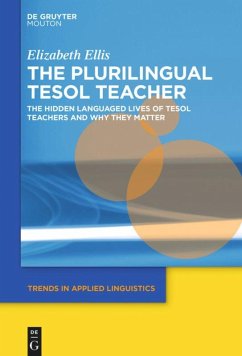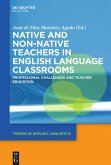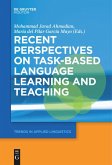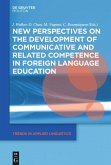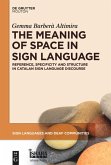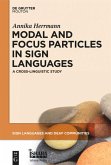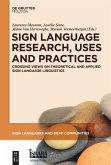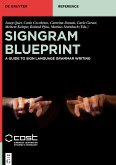This book introduces a new topic to applied linguistics: the significance of the TESOL teacher's background as a learner and user of additional languages. The development of the global TESOL profession as a largely English-only enterprise has led to the accepted view that, as long as the teacher has English proficiency, then her or his other languages are irrelevant.
The book questions this view. Learners are in the process of becoming plurilingual, and this book argues that they are best served by a teacher who has experience of plurilingualism.
The book proposes a new way of looking at teacher linguistic identity by examining in detail the rich language biographies of teachers: of growing up with two or more languages; of learning languages through schooling or as an adult, of migrating to another linguaculture, of living in a plurilingual family and many more.
The book examines the history of language-in-education policy which has led to the development of the TESOL profession in Australia and elsewhere as a monolingual enterprise. It shows that teachers' language backgrounds have been ignored in teacher selection, teacher training and ongoing professional development. The author draws on literature in teacher cognition, bilingualism studies, intercultural competence, bilingual lifewriting and linguistic identity to argue that languages play a key part in the development of teachers' professional beliefs, identity, language awareness and language learning awareness.
Drawing on three studies involving 115 teachers from Australia and seven other countries, the author demonstrates conclusively that large numbers of teachers do have plurilingual experiences; that these experiences are ignored in the profession, but that they have powerful effects on the formation of beliefs about language learning and teaching which underpin good practice. Those teachers who identify as monolingual almost invariably have some language learning experience, but it was low-level, short-lived and unsuccessful.
How does the experience of successful or unsuccessful language learning and language use affect one's identity, beliefs and practice as an English language teacher? What kinds of experience are most beneficial?
These concepts and findings have implications for teacher language education, teacher professional development and the current calls for increased plurilingual practices in the TESOL classroom.
The book questions this view. Learners are in the process of becoming plurilingual, and this book argues that they are best served by a teacher who has experience of plurilingualism.
The book proposes a new way of looking at teacher linguistic identity by examining in detail the rich language biographies of teachers: of growing up with two or more languages; of learning languages through schooling or as an adult, of migrating to another linguaculture, of living in a plurilingual family and many more.
The book examines the history of language-in-education policy which has led to the development of the TESOL profession in Australia and elsewhere as a monolingual enterprise. It shows that teachers' language backgrounds have been ignored in teacher selection, teacher training and ongoing professional development. The author draws on literature in teacher cognition, bilingualism studies, intercultural competence, bilingual lifewriting and linguistic identity to argue that languages play a key part in the development of teachers' professional beliefs, identity, language awareness and language learning awareness.
Drawing on three studies involving 115 teachers from Australia and seven other countries, the author demonstrates conclusively that large numbers of teachers do have plurilingual experiences; that these experiences are ignored in the profession, but that they have powerful effects on the formation of beliefs about language learning and teaching which underpin good practice. Those teachers who identify as monolingual almost invariably have some language learning experience, but it was low-level, short-lived and unsuccessful.
How does the experience of successful or unsuccessful language learning and language use affect one's identity, beliefs and practice as an English language teacher? What kinds of experience are most beneficial?
These concepts and findings have implications for teacher language education, teacher professional development and the current calls for increased plurilingual practices in the TESOL classroom.
"This work has clear implications for teacher language education and professional development, in the context of current calls for enhanced plurilingual practices in the TESOL classroom."
Rod Neilsen, TESOL in Context, Volume 26, No.1
"Ellis's book makes a significant case for moving beyond both the monolingual model and the native/non-native binary."
Phiona Stanley, Australian Review of Applied Linguistics 40:3
"This volume is a welcome challenge to the TESOL teaching and research communities. Ellis sets out a coherent, sustained, and well-supported argument that, as the subtitle states, the languaged lives of plurilingual TESOL teachers matter, both professionally and personally. ... Ellis sets out her argument with precision and an impressive command of existing literature in the areas of bilingualism. The book is a rich resource of relevant literature, research data analysis, and teacher vignettes. All of these elements make the book very suitable for either undergraduate or postgraduate TESOL study."
Robyn Moloney, TESOL Quarterly
Rod Neilsen, TESOL in Context, Volume 26, No.1
"Ellis's book makes a significant case for moving beyond both the monolingual model and the native/non-native binary."
Phiona Stanley, Australian Review of Applied Linguistics 40:3
"This volume is a welcome challenge to the TESOL teaching and research communities. Ellis sets out a coherent, sustained, and well-supported argument that, as the subtitle states, the languaged lives of plurilingual TESOL teachers matter, both professionally and personally. ... Ellis sets out her argument with precision and an impressive command of existing literature in the areas of bilingualism. The book is a rich resource of relevant literature, research data analysis, and teacher vignettes. All of these elements make the book very suitable for either undergraduate or postgraduate TESOL study."
Robyn Moloney, TESOL Quarterly

